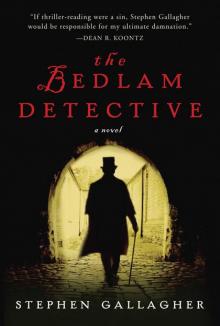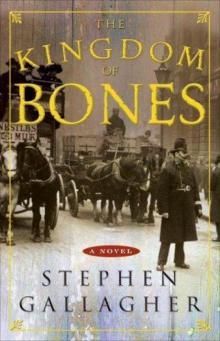- Home
- Stephen Gallagher
The Bedlam Detective Page 23
The Bedlam Detective Read online
Page 23
He stood by me and said, “Excuse me, sir,” and I hadn’t the heart to let the rocking horse incident color my response.
I’d heard the conversation with his father and so I said, “Hello, Simon. Need something for those bites?”
“Father’s told me to get some lotion.”
I looked at his legs. I saw no bug bites. Just infected scratches. In these conditions he should have been in long trousers from the beginning, regardless of youth and social convention.
“Let’s see what there is for you,” I said.
There was nothing. Someone had been at my kit, and anything that might have been useful was gone. The boy was watching me now, and I didn’t want to turn him away without at least making some effort to help him.
Then I had an inspiration and took out my hip flask. I soaked a pad in neat navy rum, and said, “Some of those wounds are quite raw, so I can tell you this will sting. But in a good way. Have you been scratching them?”
“A little,” he admitted.
“I know,” I said, “it’s hard not to. We’ll bind them up to stop them itching and give them a chance to heal.”
I swabbed his wounds with the rum, which I know must have hurt, but he remained stoical and barely made a sound. Then I tore up some linen and bound his legs in makeshift puttees. They probably wouldn’t help with the itching, but they would protect his legs and prevent him from making the scratches worse.
For the rest of the day he followed me around, offering to help with whatever job I was doing.
Disaster struck again the next morning, within an hour of continuing our journey. Our river merged with a second, faster torrent, and our pilot boat was capsized in the crosscurrent. Sir Owain, his wife, his son, the Indian, the astronomer, and two of our surveyors were dumped into the foam, along with the paddle crew. The boat was lost, but all swam to safety, or were rescued.
Which in itself would have been a comparatively happy outcome, had the boy not been dragged from the shallows unconscious. A first examination found no visible harm. But when his shirt was opened, a spreading contusion under the skin below his ribs signaled some profound hidden injury.
We were crouched on the riverbank beside the child. Sir Owain had his arms around his wife, who was holding the boy’s hand.
Sir Owain said, “What treatment can you recommend?”
I do not think that I have ever felt so helpless as I did in that moment. I said, “None that wouldn’t risk doing a lot more harm.”
“Nothing is impossible for a resourceful man,” Sir Owain said.
At which point I lost all restraint.
“You call on your resources and conjure me a hospital, then,” I said, “and I’ll give you any treatment you’re looking for. What do you imagine you’ve done, here, Owain? You’ve cut us off from all that’s civilized.”
“Please, Somerville.”
“There’s bleeding inside. All I can hope to do is drain it and hope that he bleeds no more.”
He said, “I’ve every confidence in you.”
“Then it’s misplaced!” I shouted. “I’ll do my best, but I’m no surgeon. No more of your sunny reassurances, Owain. We’re up against it now.”
We set up one of our two remaining tents and draped our last net to keep the insects out. I went around all the camaradas to see who had the sharpest knife. I sent some of the Indians out to search for leaves and bark with reputed healing properties. Everyone was looking at me as if I had some idea of what I was doing. I did not. I had these few materials and the hope, with no belief, that I might do some small measure of good with them.
My ignorance was medieval. All I could offer were the rituals of medical attention, with no significant expertise at the heart of it. I turned the unconscious child onto his side and made a cut to let out the blood, which came out thick and dark, and very slowly. When that stopped I placed him on his back and applied the healing poultice to the wound.
I feared to see him moved. But I could foresee no good outcome if we did not get him into the hands of someone more skilled.
I left him with his parents and went and sat by the river. I felt despair. After a while Sir Owain emerged from the tent and came over to me.
“He opened his eyes and spoke my name,” he said. “I do believe he’s stronger already. Well done, man.” And he clapped me on the shoulder.
Through all our trials, he seemed to have learned nothing. If we can assume that Owain did not imagine them, those few words were the last his son would ever speak.
It hardly mattered whether my crude surgery had been in any way effective, because an infection quickly set in around the wound that I’d made. At the same time, Sir Owain drew my attention to the fact that the boy’s mother was ailing as well.
“My dear Bernard,” he said to me. “Could you take a look at Mrs. Lancaster? I’m not sure I like her color.”
Somerville paused. Sebastian was aware of the superintendent’s deputy taking out his pocket watch and checking the time.
The botanist said, “Would it endanger my privileges if we were to continue my story tomorrow? You must agree that I have been a willing witness.”
“Is there much more to tell?” Sebastian said.
“No, but what remains is the most important part,” Somerville said, “and I am beginning to tire. I do not mean to be uncooperative. I only wish to do the story justice.”
Sebastian looked at Evangeline. She offered no argument. All but the botanist rose to their feet. The deputy superintendent’s relief was palpable. Sebastian said, “Can it be arranged?” and the deputy agreed that it could.
Evangeline said to the botanist, “Do you know why you’re here?”
“I know what they’ve told me.”
“Which is?”
“That I flew at my sister in a moment of madness. But I love my sister dearly. It’s inconceivable that I would ever want to do her harm.”
“And yet you did.”
“I cannot explain it. Trying to makes it worse. So all in all,” he said, indicating the small room into which they were all crowded, “I would rather she was safe from me, and I was here.”
Sebastian said, “In that moment between sleep and waking. What did you take her for?”
Somerville shook his head.
“Who knows what I saw then?” he said. “I truly don’t.”
FORTY-TWO
After making arrangements for the next morning and taking his leave of Evangeline at Waterloo Station, Sebastian made his way home. There were no messages for him at the pie stand. He hesitated at the street door to his apartments, knowing that he ought to take down or replace the wreath. Until he could afford the headstone, it was Elisabeth’s only memorial. He had no mourning suit, and to be seen in a black armband was bad form on any man not in the military.
He’d deal with it another day.
He found Robert waiting at the top of the stairs, eager to give him news. Frances was in the back, preparing their evening meal.
Robert said, “Doctor Percival took me to the natural history museum.”
“Just you?”
“And Frances.”
“Ah,” Sebastian said. “Good for him.”
He did not know Dr. Percival. All of his dealings had been with the brother, Dr. Reginald. Because of all their early correspondence over Robert’s education, the Langdon Down family had stayed in touch. They had even sent a representative to Elisabeth’s funeral.
Robert said, “I love the museum. I could spend forever there.”
Frances chipped in at that point, appearing in the doorway. “Spend forever?” she said, wiping her hands on a white towel and smiling to show that this was no complaint. “I was beginning to think he was planning to. We never got beyond the east wing.”
“You should go sometime, Father,” Robert said. “I’ll take you. There’s a pavilion with all the creatures from Buenos Aires we’ve been talking about.”
“I doubt that you’ll find Sir Owain’s cr
eatures in any museum. Not in this world, anyway.”
“But the Indians say that makes no difference. I like the idea that spirits can pass back and forth between life and dreams. Because it means that Mother’s still somewhere close, even if she’s nowhere we can see.”
Sebastian caught Frances glancing at him. He briefly met her eyes and said, “Do you dream of her often, Robert?”
“All the time,” Robert said, almost cheerily. “You should, too. Then you’d know she’s always right here and you wouldn’t have to be so sad.”
To which Sebastian had no ready answer; and so with a change of subject that was like a crash of changing gears, he said, “And are those hands clean?”
Like a child ten years younger, Robert held his hands up for inspection.
Sebastian gave them a critical look and said, “I’d say they could use a wash before supper.”
Robert looked bemused, but he didn’t argue. He went off into the next room and ran the scullery tap.
Sebastian said to Frances, “Depending on what I learn tomorrow, I may have to go back to Arnmouth and finish my business there.”
“All right,” she said.
Belatedly, he realized what he’d be asking of her. She’d have sole charge of the household, and sole charge of Robert, for several days. Yet they’d had no discussion of such matters. Selfishly, he’d given such future arrangements no thought at all.
He said, “Are you sure?”
“Of course,” she said, and added a reassuring little smile. “Leave me the rent and five pounds. Shall I pack a bag for you?”
“No,” he said. “I’ve given you enough to do.”
He went into the bedroom alone. At the foot of the bed, Elisabeth’s old cabin trunk did double duty as a linen chest. He crouched before it and raised the lid. Then it hit him all at once: the scent of Elisabeth, of lavender and roses, from a sachet bag that she’d put in with the sheets and occasionally replenished with a few drops of her own perfume.
He was unprepared and, for a moment or two, incapable of anything. The sense of her returned presence was overpowering. All purpose was briefly dashed out of him.
He recovered quickly, but with his wounds refreshed. Under the lid was a secret compartment with a double-latch lock. Originally meant for the jewelry that Elisabeth had sold to buy their steamer tickets, the recess now contained a pocket-sized revolver wrapped in an old shirt, the gun’s cleaning kit, and a box of ammunition.
Sebastian took out the revolver and checked it. He’d bought it from a pawnbroker to replace the Bulldog pistol that he’d carried in his Pinkerton days. In England he’d had little use for it.
The last time he’d handled a pistol had been during the siege at the children’s ward. The day of Elisabeth’s murder, if only he’d known it. Seated on the bed with the empty gun in his hand, he suddenly found himself all but robbed of the strength to rise. He put his hand over his eyes and waited for tears that threatened, but did not come.
He wasn’t sure how, but his sister-in-law’s ready kindness had disarmed him. Perhaps he could take this one moment for himself. One moment to let out a little of the pain, and with that pressure vented he’d be able to go on.
He hadn’t heard Frances come in. But then he hadn’t been aware of the sound he must have made, either.
She knelt down before him and took his hand in her own.
“Sebastian,” Frances said. “Don’t fret. She said that all would be well. I do believe she’s with us, and she still intends it will.”
“Frances,” he said, recovering as best he could. “Aren’t you the strong one?”
Releasing his hand, she stood up, crossed the room, and closed the bedroom door. Then she moved back to sit on the bed beside him.
“We must have a serious talk about Robert,” she said.
“Why? Is something wrong?”
“No,” she said. “Nothing’s wrong. Doctor Percival thinks highly of him. He asked if we had considered what steps might be taken toward giving Robert his independence.”
“Independence?” Sebastian said. “I know he has a strong and capable mind, but he thrives with the support of those who love him.”
“Don’t mistake me,” she said, “I love Robert as much as you, but we need to face the fact that he’ll outlive us both. And when we’re gone, what then? An institution, Sebastian, to see out his days. He has no other family here.” She glanced down at the revolver. “You spend your days in pursuit of lunatics, some of them dangerous,” she said. “He’s lost one parent. If he loses the other, how will I support him alone?”
Sebastian was lost for a reply. The challenges surrounding Robert had always been immediate ones. Questions of the longer term had never arisen.
He said, “What do you propose?”
Frances said, “Doctor Percival has observed Robert’s phenomenal powers of analysis. He says that in the matter of employment you’ve set your sights far too low. With your permission he wishes to explore the possibility of finding Robert a placement in one of our scientific institutions.”
Sebastian could not quite believe it. “When was this discussed?” he said.
“This afternoon. At the museum. It was one of the purposes of the visit. Imagine it, Sebastian. He might even progress to an income and rooms of his own. With a housekeeper to take care of his needs, of course.”
“Does that mean you would leave me too?”
“No, Sebastian,” she said. “But I’ve been Robert’s faithful keeper for long enough. I can hope someday to be his loving aunt. I would not leave you. Unless I understood that you wanted me to.”
For Sebastian it was as if doors were opening and his life, after hurtling along blindly in the wake of Elisabeth’s death, were being pushed to make a necessary turn.
“Can we discuss this again?” he said.
“We will,” Frances said, and rose to her feet. She steadied herself with a touch on his arm, and he responded with a supporting hand. There was a surprising solidity to her; her looks had always been so delicate that he’d imagined her to be almost without substance.
“Thank you,” she said, and squeezed his hand before she stepped around him to leave.
FORTY-THREE
On her way home that evening, Evangeline stopped at a post office and spent a penny-farthing on a letter card to inform her employers of a continuing indisposition. If they suspected her, let them dismiss her. She might forgo their good references, but she had wits enough to get around the problem without resorting to forgery.
The next day, she met Sebastian Becker at Waterloo Station and they made their second journey out to Broadmoor.
The same deputy superintendent met them in the carriage yard between the gates, and from there they passed on into the asylum proper. The enclosing wall was topped with spikes and broken glass. Within it stood a central hall with residential wings to either side of it, and a terrace walk for fresh air and exercise. One wing contained a women’s prison, where it was said that most of the inmates had been committed for the murder of their children.
Somerville was waiting in his cell with the door open. This time he seemed pleased to see them. The tale that he had begun in reluctance had become his unburdening.
Sebastian said, “Are you ready for us, Doctor?”
“I believe I am,” Somerville said.
He began-
I can’t say what it was-grief, fever, some parasitic invasion from her dousing in the river-but before long both mother and son were dying together. I was tempted to believe that the boy was dead already, rotting and breathing in some collapse of the natural order. Neither could be moved. The woman threw convulsions, and screamed if anyone touched her.
Since Sir Owain never speaks of his wife now, I shall.
I cannot say I knew her. No one on the expedition did. Most thought her aloof, and some were critical of her for bringing a child into a hostile wilderness without any grasp of what life in a wilderness entailed. But to my mind, her only
crime had been to obey her husband, whose determination to treat this far-off place as but a distant corner of his own domain had led to all their sufferings.
He had to know it. When a man who demands his own way in all things is faced with the disastrous consequences of his actions, he has to know who brought them on. But can a man’s mind bear up under such knowledge? I don’t believe that it can. I stand before you as a living example. I may present myself in a rational manner, but I have found myself capable of acts outside my own control. Sir Owain is no different. And I believe we saw the proof of this in the days that followed.
At night, we heard those animal sounds outside the camp again. Sir Owain took his hunting rifle, and with no thought of personal danger he struck out into the darkness.
“Show yourself!” he’d call out. “You won’t have them! Don’t think you can hide from me!” And we heard him for some time after that, as he stumbled deeper and deeper into the jungle.
That became a routine for the next few days. I don’t believe that Sir Owain slept at all. By day he sat in the tent between his dying wife and child. At night he was out there at the first sound, blaming all of his ills on that which he could not see, seeking to confront and defy it, but never being given the chance. The rifle was always in his hand, and all of us stayed out of his way; no one wanted to be mistaken and shot.
He came back to the camp on the second morning, after roaming abroad all night, and tried to tell me a tale.
“Somerville,” he said. “You must listen. You must. It was a revelation. I’ve had a revelation.”
He was wild-eyed, and close to the brink of madness. He spoke of a confrontation with the beast that had been following us and that threatened all our lives. But the details kept changing, as if he were speaking of a dream and did not realize it.

 The Boat House
The Boat House The Bedlam Detective
The Bedlam Detective Valley of lights
Valley of lights The Kingdom of Bones
The Kingdom of Bones